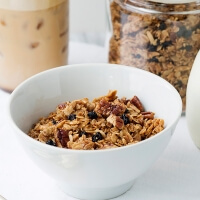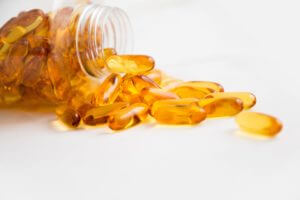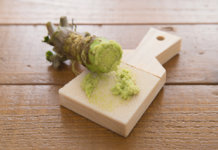From increased calcium, vitamin D and protein needs to decreased overall calories, it’s no surprise that our nutritional needs change as we age. However, many people aren’t aware of one common nutrient deficiency in the aging population: Vitamin B12.
What is Vitamin B12?
Also known as cobalamin, vitamin B12 is a water-soluble vitamin that can only be obtained through the diet as our bodies can’t make it themselves.
While we’ll get to food sources later in this post, vitamin B12 is often found bound to animal protein that has to get broken down by gastric acid and an enzyme called pepsin, both found in the stomach. Once B12 is unbound, it travels to the small intestine where a substance known as intrinsic factor allows it to be absorbed into the bloodstream.
Once it’s carried to the cells, vitamin B12 can carry out its essential functions, including the production of red blood cells and DNA as well as ensuring proper functioning of the nervous system.
Vitamin B12 is unique in that it’s one of four vitamins that is stored in the liver. In fact, the liver is able to hold up to a 1-3 year supply of vitamin B12. As it’s water soluble, any excess vitamin B12 can be expelled by the body.
Causes of B12 Deficiency
There are numerous causes of B12 deficiency including:
- Inadequate intake in the diet (rare)
- Surgeries in which portions of the stomach and/or small intestines are removed, including bariatric surgery
- Chronic use of antacids
- Metformin use
- Malabsorption
The most common cause of deficiency in adults over 50 is malabsorption due to age-related physiological changes.
As we age, the gastric acid secretion declines, resulting in a decreased ability to extract the vitamin B12 that’s bound to protein in food. Without being able to free vitamin B12, our bodies can’t fully absorb it, and overtime this can lead to a deficiency.
Some adults may also be diagnosed with pernicious anemia, which is an autoimmune condition in which the body doesn’t produce enough intrinsic factor to properly absorb vitamin B12 in the small intestine.
Signs and Symptoms of Vitamin B12 Deficiency
Unfortunately, signs of vitamin B12 deficiency can take years to manifest and are often masked by low folate levels.
As vitamin B12 is needed for folate production, when B12 levels are low, folate levels also drop. As a result, some individuals are instructed to take folate supplements, but they never get formally tested for vitamin B12 deficiency. While folate levels will improve with supplementation, B12 levels will remain low but may be hard to detect.
One of the earliest signs of deficiency is glossitis, which is inflammation and redness of the tongue. Other signs include:
- Jaundiced skin
- Weakness and fatigue
- Changes to balance and coordination
- Numbness or tingling of the hands, feet, or legs
- Mouth ulcers
- Shortness of breath and dizziness
- Blurred or disturbed vision
- Mood changes
- Memory loss
- Paranoia
- Difficulty thinking and reasoning
Left untreated, vitamin B12 deficiency can lead to serious neurological complications that are not always fully reversible with supplementation.
Prevalence of Deficiency in the Elderly
While previous data have suggested that nearly 6% of adults under the age of 60 and 20% in those 60 and older are deficient in vitamin B12, many experts suspect the actual prevalence is under-reported. A more recent study out of Ireland found that 1 in 8 adults aged 50 and older had diagnosable vitamin B12 deficiency.
RDA and Food Sources
Clearly vitamin B12 is an important nutrient, but how much do we need?
The current RDA for males and females over 14 years of age is 2.4 mcg per day. But how do we get it?
10 Excellent Naturally Occurring Food Sources of Vitamin B12
- Liver: while high in fat, organ meats are one of the best sources of B12, with a 3.5-ounce portion of liver (lamb, veal or beef) contains up to 1,500% of the RDI.
- Clams: a 3.5-ounce serving of clams contains up to 1,600% of the RDI, with 3.5 ounces of calm broth providing around 112% of the RDI.
- Salmon: rich in heart-healthy omega-3 fatty acids, a half filet (178 grams) of salmon also provides 80% of the RDI for B12.
- Wild rainbow trout: one of the healthiest fish options, a 3.5-ounce portion provides 125% of the RDI.
- Tuna: both canned and fresh tuna contain a good amount of B12; however fresh will have the most with a 3.5-ounce serving of cooked tuna providing 157% of the RDI.
- Beef: while different cuts of meat will vary slightly, in general a 3.5-ounce serving of beef contains 102% of the RDI.
- Cow’s milk: one cup of whole milk provides up to 23% of the RDI
- Yogurt: one cup of full-fat yogurt also provides up to 23% of the RDI
- Cheese: out of all the cheeses, swiss is the highest in B12 with one ounce containing 16% of the RDI.
- Eggs: two large eggs provides about 22% of the RDI.
However, as mentioned above, as we age our bodies have a harder time absorbing vitamin B12 that’s bound to protein. Supplements and fortified foods, on the other hand, aren’t bound to protein, making them more readily available to the body.
 Good sources of B12 fortified foods:
Good sources of B12 fortified foods:
- Nutritional yeast: 2 tablespoons provides an impressive 130% of the RDI
- Breakfast cereals: while it varies by brand, fortified cereals a ¾ cup serving of breakfast cereal can provide between 25-137% of the RDI
- Soy milk: one cup of fortified milk provides 45% of the RDI
Do I need a Vitamin B12 Supplement?
If you’re over the age of 50 it’s worth talking to your doctor or dietitian about taking a supplement for vitamin B12. For those taking Metformin, have had stomach surgery, or are chronically taking antacids, it’s very likely that your doctor will want you to take a supplement. However, the exact dosage will vary by individual.
While otherwise healthy adults can take B12 pills or lozenges, for those diagnosed with pernicious anemia, muscular injections are likely indicated.
Bottom Line
As we age, our bodies lose the ability to properly absorb vitamin B12. While consuming foods high in vitamin B12, is important, additional supplementation may be needed. Make sure to talk to your primary care provider or registered dietitian at your next visit about whether or not you could personally benefit from them.








